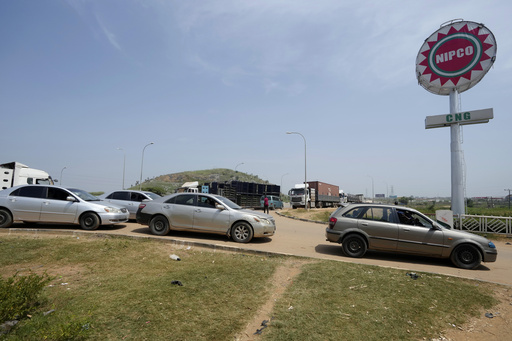
ABUJA, Nigeria — Following President Bola Tinubu’s decision to eliminate costly fuel subsidies that maintained affordable petrol prices in Nigeria, many, including e-hailing cab operator Ahmed Halilu, predicted difficult times ahead.
In the aftermath of this policy change, transportation expenses surged as petrol prices skyrocketed, more than tripling within months. The sharp increase triggered a severe cost-of-living crisis, the worst the country has faced in a generation, significantly reducing the number of passengers for Halilu and subsequently diminishing his income.
To mitigate these rising costs and promote more sustainable energy sources, Nigerian authorities introduced a compressed natural gas (CNG) initiative in August. This project aims to utilize Nigeria’s vast gas reserves—the largest in Africa—by launching CNG buses and converting petrol-powered vehicles to natural gas.
The initiative has seen over 100,000 vehicles converted to run on either CNG or a hybrid of CNG and petrol, with government investments exceeding $200 million, as reported by project director Michael Oluwagbemi. The government has set an ambitious target to convert 1 million of the country’s more than 11 million vehicles in the next three years; however, analysts argue that progress has been sluggish due to inadequate infrastructure and poor execution.
Although Nigeria ranks among Africa’s leading oil producers, it relies heavily on imported refined petroleum products due to underperforming local refineries that have hit record low output levels amid rampant oil theft.
Tinubu’s broader reforms, including the subsidy removal, aimed to stabilize government finances and attract foreign investments. Yet, the repercussions have resulted in increased prices across various sectors, with many individuals resorting to walking to work as transportation costs climb.
Transitioning to CNG has proven challenging, particularly due to a lack of an extensive network of conversion and filling stations, which are currently available in only 13 of Nigeria’s 36 states. Low public awareness about the initiative has contributed to misconceptions and reluctance among potential users.
Halilu noted the widespread uncertainty surrounding the transition, stating that many people are reluctant to embrace CNG due to insufficient orientation. After converting his vehicle, he now saves approximately $240 monthly on fuel expenses for his e-hailing service.
Concerns regarding safety have also surfaced, with some drivers fearing that their vehicles may explode due to CNG conversions. Regulatory bodies have addressed these concerns, asserting that explosions typically occur only if the conversion is mishandled. For instance, authorities in southern Edo state reported that a CNG vehicle explosion involved work from an unaccredited vendor.
Even in major urban centers like Abuja and Lagos, the limited number of filling stations and conversion workshops has led to long waits for commercial vehicle drivers seeking subsidized conversion rates. Aside from commercial categories, the cost for private vehicle conversions remains prohibitively high, reaching 20 times Nigeria’s minimum monthly wage of $42.
Abdul Manasseh, another e-hailing driver, shared his experience of having to travel around 200 kilometers (124 miles) just to refill his CNG cylinder in Abuja.
Further complicating the CNG shift is Nigeria’s inadequate gas pipeline network, which hampers the ability to supply filling stations, leaving many areas in the northern and eastern parts of the country without access.
These hurdles echo the struggles found in transitioning to electric vehicles in Nigeria, where adoption rates among private operators remain low due to sporadic power supply, driven by chronic underinvestment and vandalism.
The government acknowledges the existing “uncertainty” surrounding the CNG initiative and is working to dispel myths while enhancing infrastructure, as stated by Tosin Coker, who oversees commercial matters for the initiative.
“CNG is a cleaner fuel, it is a cheaper fuel, and it is a safer fuel compared to the petrol that we are used to,” Coker affirmed. “By adopting CNG, you will save money and contribute positively to the environment.”
